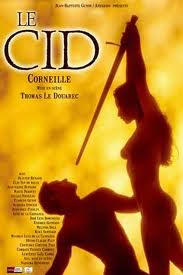Le Cid
Date: 1637 1660
Region: Europe
Subject: Explicit Sexuality
Medium: Theatre
Artist: Pierre Corneille (1606 - 1684)
Confronting Bodies: Academie Francaise
Dates of Action: 1637, 1660
Location: France
Description of Artwork: Corneille took material for the plot of Le Cid from a Spanish play based on 11th century history called Las Mocedades del Cid. Corneille labeled the work a tragi-comedy, indicating that its subject was fictional. The play's theme is the conflict between love and honor. In the play Rodrigue (Le Cid) has to avenge his father's death by killing his lover's father. Despite the fact that he has killed her father, his lover and he are eventually reunited after many trials.
The Incident: A few weeks after the play opened the poet Georges de Scudery attacked the play saying that the behavior of Le Cid's lover, Chimene, was scandalous. The fact that she would still marry Le Cid despite the fact he killed her father proves that she is immoral and "unnatural." Scudery was also offended by the fact that Corneille cited history; he felt that history and fiction should be two entirely separate things. After much debate over the play the Academie Francaise published its official opinions on the play. The Academie Francaise was founded in 1634 by Cardinal Richelieu to develop the French language and literature. It also wielded considerable political influence. The Academie's offical opinion was in accordance with Scudery's. They believed that Corneille had depicted Chimene's love too vividly. Because Corneille was a pensioned writer he could not turn down these recommendations and so he was forced to alter almost a sixth of the lines, and the new version was published in 1660.
Results of Incident: The new version of the play published in 1660 had much more focus on politics and less on honor. In 1648, after Cardinal Richelieu died and he had been admitted into the Academie Francaise Corneille wrote a forward to the revised edition of Le Cid saying that he felt his censors had put too much stress on poetic rules.
Source: Censorship: A World Encyclopedia

